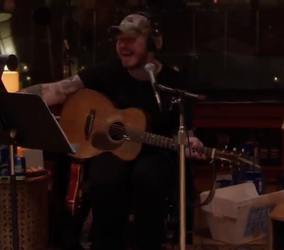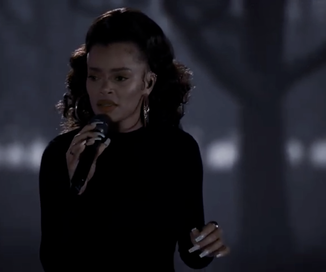Matthew McConaughey, Texas' Brightest Musicians Come Together to Help State Affected by Winter Storm3/21/2021  Screenshot Screenshot by Julian Spivey Oscar-winning actor Matthew McConaughey and his Just Keep Livin’ Foundation held a virtual concert called “We’re Texas” to help raise funds for Texans impacted by a huge winter storm in February that saw devastation across the state. The virtual concert featured performances by some of Texas’ brightest stars with videos from some of the Texans impacted by the storm and McConaughey and his foundation pitching in to help them with specific needs. There were three ways folks could donate during the broadcast, by hitting the donate button on the YouTube feed of the special, via text or by going to jklivinfoundation.org. The virtual concert had earned more than $227,000 just via folks donating through the YouTube donation option by the end of it two hour and 15 minute runtime. Los Lonely Boys kicked off the evening of performances, all which were done from the artist’s homes and sent in virtually, with a performance of their 2004 no. 16 hit “Heaven,” which was popular among pop, rock and country fans alike. Don Henley, of Linden, Texas, performed an old Jesse Winchester penned song “Snow” dressed in warm clothing and mockingly playing a snow shovel like a guitar. Among the many terrific country music acts from Texas that performed during the virtual concert were hall of famer Willie Nelson (probably Texas’ greatest son) performing “Beautiful Texas,” Miranda Lambert performing her 2009 no. 1 “Heart Like Mine,” George Strait performing his 2008 top-10 hit “Troubadour” and Clint Black performing one of his earliest smash hits “Killin’ Time.” Kacey Musgraves covered Willie Nelson’s classic “On the Road Again” in hopes that it wouldn’t be much longer before she and her fellow musicians around the country and world go once again get back to touring and doing what they love best. As someone who hasn’t been to a live concert in more than 13 months now I can’t wait either. These virtual shows are terrific, but nothing is a substitute for live music. Texas Red Dirt Country was represented during the virtual concert with Randy Rogers performing “Buy Myself a Chance” and Parker McCollum doing “Pretty Heart.” There are plenty of great musicians from Texas that don’t fall within the country music genre or subgenres and that was shown with smooth R&B performances by Leon Bridges doing “Texas Sun” and Khalid doing “Angels.” I particularly enjoyed the blues-rock of Gary Clark Jr. performing “When I’m Gone.” Kirk Franklin also brought some gospel with “I Smile” and Kelly Clarkson stunned with a bluesy number called “Whole Lotta Woman.” The biggest surprise of the entire evening came during the final performance of “We’re Texas” when major Grammy-nominated pop star Post Malone showed off his love for country music by performing a nice cover of Brad Paisley’s humorous 2001 fishing song “I’m Gonna Miss Her” and then doing a nice version of Sturgill Simpson’s “You Can Have the Crown” during the credits of the special, which was very random and awesome in its randomness. I wouldn’t mind hearing Post Malone do a country record. “We’re Texas” was a great evening of music for a state that could truly use a bit of help right now, especially when some of its own politicians sworn to serve its people have turned their backs on their citizens. If you would like to donate to the cause please go to jklivinfoundation.org.
0 Comments
 Screenshot Screenshot by Julian Spivey The Grammy’s Salute to the Sounds of Change two-hour concert special aired on CBS on Wednesday, March 17 and featured numerous great performances, but also featured some curious omissions. “Sounds of Change” is a broad topic, but the show did a good job of trying to get performances into the show involving civil rights, LGBTQ rights, women’s rights, as well as anti-war songs. The special was hosted by Grammy and Oscar-winning rapper Common, who did a good job at interweaving stories about the performances and showing past clips of historical moments captured during past Grammy Award telecasts like Aretha Franklin performing Simon & Garfunkel’s “Bridge Over Troubled Water” and the memorable performances some years back of “Same Love” by Macklemore and Ryan Lewis featuring Mary Lambert and Madonna in which many couples were married live on the Grammys by Queen Latifah as officiant. Singer and actress Cynthia Erivo kicked off the performances on the evening with a nice cover of John Lennon’s 1971 classic “Imagine,” which longs for a world full of love and without any evils. Smooth voiced Chris Stapleton crooned a nice version of Louis Armstrong’s “What A Wonderful World,” though it was an interesting choice given some of the classic “songs of change” that were left out of the special, but I’ll have more on that in a bit. I was happy to see Loretta Lynn’s “The Pill,” a controversial song of its time about how women now had a choice when it came to having babies or not, featured and while LeAnn Rimes did a fine job on the song her vocals were occasionally drowned out by the backing band doing a more rocking version of the song. Potentially the best performance of the evening was Andra Day performing Billie Holiday’s incredibly important anti-lynching ballad “Strange Fruit,” which truly altered her career and life. Day recently won a Golden Globe award for portraying Holiday in Lee Daniels’ new film “The United States vs. Billie Holiday,” which is Day’s film debut and can be seen now on Hulu. Most performances during the special were straight forward covers, but reigning Country Music Association Entertainer of the Year Eric Church, one who’s never afraid of trying something new put a funky take on Edwin Starr’s 1970 anti-war classic “War.” My personal favorite segment of the special was John Fogerty’s two-song set of “Weeping in the Promised Land” and “Fortunate Son.” The performance began with Fogerty on the piano with accompaniment from a gospel choir doing “Weeping in the Promised Land,” a brand new song he released in early January about the struggles faced in the country over the last half decade or so. He then performed a terrifically full-bad rock performance of “Fortunate War,” his anti-Vietnam song from the late ‘60s that took on the well-to-do establishment that sent less fortunate young men to die for a war the country never should’ve been in to begin with. Another favorite performance of mine came toward the end of the program when Brad Paisley performed “Welcome to the Future,” from his 2009 album American Saturday Night, which was inspired by the 2008 Presidential election of Barack Obama as the first African-American President in U.S. history. It’s a terrific song, but I’d be remised if I didn’t say the last decade or so has shown this country still has plenty far to go before things are close to being equal, but it’s definitely a reminder that in some ways they are better than they once were. Other fantastic performances during the special included Patti LaBelle performing Leslie Gore’s 1963 hit “You Don’t Own Me,” which came out almost a full decade before the feminist movement, and Gladys Knight performing the Marvin Gaye classic “What’s Going On.” Emmy-winning actor Billy Porter’s performance of LaBelle’s “You Are My Friend” was also a touching moment as Porter talked about how sometimes close friends truly become your family and how big of a thing this is within the LGBTQ community. My biggest complaint of the Grammy’s Salute to the Sounds of Change was what was left out, rather than what was actually performed on the show. When I think of “sounds of change” within music there are a few performers I automatically think of – Bob Dylan and Woody Guthrie. Neither of these artists had songs covered on the program, though Dylan was briefly mentioned, as well as Guthrie’s “This Land Is Your Land,” which I genuinely believe should be adopted as the new National Anthem of this country. The ‘Sounds of Change’ special ended with an upbeat gospel performance by Yolanda Adams doing the civil rights anthem “We Shall Overcome,” which has been a major song of change for more than a century and remains as relevant today as it ever has. |
Archives
July 2024
|